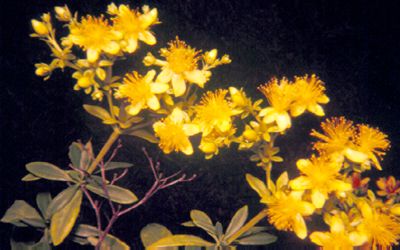Family: Clusiaceae

Hypericum densiflorum Pursh - Bushy St. John's-wort
Photo © by Brooklyn Botanic Garden
Taken by G. A. Kalmbacher, 1961.
Taken by G. A. Kalmbacher, 1961.
By Kerry Barringer
Not peer reviewed
Last Modified 03/19/2013
List of Clusiaceae Genera
References to Clusiaceae
- Adams, P. 1973. Clusiaceae of the southeastern United States. J. Elisha Mitchell Sci. Soc. 89: 62-71.
- Adams, W. P. 1957. A revision of the genus Ascyrum (Hypericaceae). Rhodora 59(700): 73-95.
- Adams, W. P.; Robson, N. K. 1961. A re-evaluation of the generic status of Ascyrum and Crookea (Guttiferaceae). Rhodora 63: 10-16.
- Adams, W. P.; Robson, N. K. 1961. A re-evaluation of the generic status of Ascryrum and Crookea (Guttiferacae). Rhodora 63: 10-16.
- Allison, J. R. 2011. Synopsis of the Hypericum denticulatum complex (Hypericaceae). Castanea 76: 99-115.
- Barcaccia, G. et.al. 2006. Genetic diversity and reproductive biology in ecotypes of the facultative apomict Hypericum perforatum L. Heredity 96: 322-334.
- Bartgis, R. L.; Hutton, E. E. 1988. Additions to the known flora of West Virginia. Castanea 53: 295-8.
- Bartholomew, E. A. 1950. The family Hypericaceae of West Virginia. Castanea 15: 102-9.
- Bosy, J. L.; Reader, R. J. 1995. Mechanisms underlying the suppression of forb seedling emergence by grass (Poa pratensis) litter. Funct. Ecol. 9: 635-639.
- Britton, Nathaniel L. 1890. New or noteworthy North American phanerogams. III. Bull. Torrey Bot. Club 17: 310-6.
- Cooperrider, T. S. 1989. The Clusiaceae of Ohio. Castanea 54: 1-11.
- Coulter, J. M. 1886. Revision of the North American Hypericaceae. Bot. Gaz. 11: 80-1.
- Crepet, W. L.; Nixon, Kevin C. 1998. Fossil Clusiaceae from the late Cretaceous (Turonian) of New Jersey and implications regarding the history of bee pollination. Amer. J. Bot. 85: 1122-1133.
- Crompton, C. W. et.al. 1988. The biology of Canadian weeds. 83. Hypericum perforatum L. Canad. J. Pl. Sci. 68: 149-162.
- Fernald, M. L. 1936. Plants of the Outer Coastal Plain of Virginia. Rhodora 38: 376-404,414-52.
- Fernald, M. L. 1936. The varieties of Ascyrum hypericoides. Rhodora 38: 430-3.
- Fernald, M. L.; Schubert, B. G. 1948. Studies of American types in British herbaria. Rhodora 50: 149-76, 181-208, 217-33.
- Gillet, J. M.; Robson, N. K. B. 1959. The St. John's worts of Canada. Natl. Mus. Canad. Nat. Sci. Publ. Bot. 11: 1-end.
- Gleason, H. A. 1971. Triadenum. Phytologia 2: 288-291.
- Gustafsson, M. H. G.; Bittrich, V.; Stevens, P. F. 2002. Phylogeny of Clusiaceae based on rbcL sequences. Int. J. Plant Sci. 163: 1045-1054. (Also Podostemaceae)
- Hoar, C. S.; Haertl, E. J. 1932. Meiosis in the genus Hypericum. Bot. Gaz. 93: 197-204.
- Maffi, L. et.al. 2004. Morphology and development of secretory structures in Hypericum-perforatum and H. richeri. Nordic J. Bot. 23: 453-461.
- Merriam, J. S. 1870. Ascyrum crux-andreae. Bull. Torrey Bot. Club 1: 44.
- Müller, K. 1882. Vergleichende Untersuchungen der anatomischen Verholtnisse der Cluseaceen, Hypericaceen, Diptterocarpaceen und Ternstroemiaceen. Bot. Jahrb. Syst. 2: 430-64. (In German)
- Nurk, N. M.; Blattner, F. R. 2010. Cladistic analysis of morphological characters in Hypericum (Hypericaceae). Taxon 59: 1495-1507.
- Perez-Garcia, F. et.al. 2006. Hypericum perforatum L. seed germination: interpopulation variationand effect of light, temperature, presowing treatments and seed desiccation. Genetic Resources and Crop Evolution 53: 1187-1198.
- Reznicek, A. A. 1985. Tridenum virginicum (L.) Raf. (Marsh St.Johns-wort) in Ontario. Plant Press 3: 124-125.
- Robson, N. K. B. 1981. Studies in the genus Hypericum L. (Guttiferae): 2. Characters of the genus. Bull. Nat. Hist. Museum Bot. 8(2): 55-226.
- Robson, N. K. B. 1977. Studies in the genus Hypericum L. (Guttiferae): 1. Infrageneric classification. Bull. Nat. Hist. Museum Bot. 5(6): 291-355.
- Robson, N. K. B. 1972. Evolutionary recall in Hypericum Guttiferae? Trans. & Proc. Bot. Soc. Edinburgh 41(3): 365-83.
- Robson, N. K. B. 1996. Studies in the genus Hypericum L. (Guttiferae) 6. Sections 20. Myriandra to 28. Elodes. Bull. Nat. Hist. Museum Bot. 26: 75-217.
- Robson, N. K. B. 2001. Studies in the genus Hypericum L. (Guttiferae) 4(1). Sections 7. Roscyna to 9. Hypericum sensu lato (part 1). Bull. Nat. Hist. Museum Bot. 31: 37-88.
- Robson, N. K. B. 2002. Studies in the genus Hypericum L. (Guttiferae) 4(2). Section 9. Hypericum sensu lato (part 2): subsection 1. Hypericum series 1. Hypericum. Bull. Nat. Hist. Museum Bot. 32: 61-123.
- Robson, N. K. B.; Adams, P. 1968. Chromosome numbers in Hypericum and related genera. Brittonia 20(2): 95-106.
- Seetharam, Y. N. 1987. Clusiaceae: palynology and systematics. Indian Sci. Congr. Assoc. Proc. 3: 157.
- Seetharam, Y. N. 1985. Clusiaceae: palynology and systematics. Trav. Sect. Sci. Techn. Inst. Franc. Pondichery 21: 1-80. (With 52 plates)
- Svenson, H. K. 1940. Plants of the southern United States. III. Woody species of Hypericum. Rhodora 42: 8-19.
- Svenson, H. K. 1952. What is Hypericum prolificum? Rhodora 54(644): 205-7.
- Vestal, P. A. 1937. The significance of comparative anatomy in establishing the relationship of the Hypericaceae to the Guttiferae and their allies. Philipp. J. Sci. 64: 199-256.
- Wilson, S. D. 1991. Plasticity morphology and distribution in twelve lakeshore plants. Oikos 62: 292-298.
- Wood, C. E.; Adams, P. 1976. The genera of Guttiferae (Clusiaceae) in the southeastern United States. J. Arnold Arbor. 57: 74-90.
- Zika, P. F. 2003. Notes on the provenance of some eastern wetland species disjunct in western North America. J. Torrey Bot. Soc. 130: 43-46.